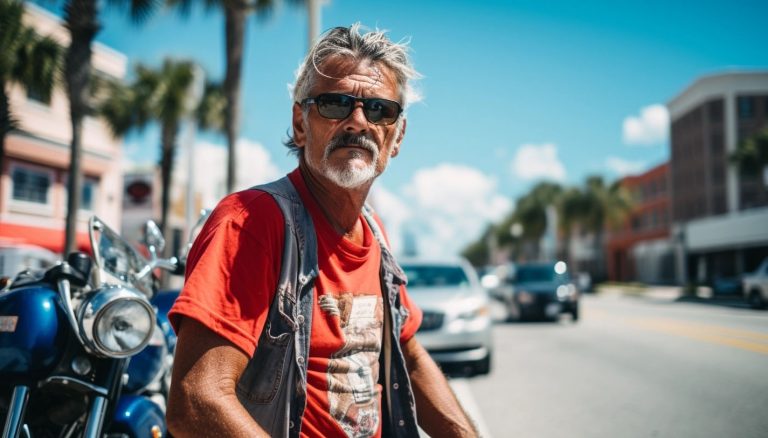Am I Eligible for compensation If I was not wearing a helmet?
 Michael Babboni
Car Accidents
Motorcycle Accidents
Personal Injury
Whether you are cruising the streets in downtown St Petersburg, or out touring the rural roads in central Florida, Riding a motorcycle can be an exciting adventure, however, it can have its fair share of risks. This year alone, Florida has already witnessed 2,482 motorcycle accidents, adding to the 9,146 reported last year.
Michael Babboni
Car Accidents
Motorcycle Accidents
Personal Injury
Whether you are cruising the streets in downtown St Petersburg, or out touring the rural roads in central Florida, Riding a motorcycle can be an exciting adventure, however, it can have its fair share of risks. This year alone, Florida has already witnessed 2,482 motorcycle accidents, adding to the 9,146 reported last year.If you're unfortunate enough to suffer injuries in a motorcycle accident on the streets of Saint Petersburg, such as on Central Avenue or 34th Street, you may be eligible for compensation. However, whether you were wearing a helmet can significantly impact the amount you may receive. Both the state helmet law and the recently revised comparative negligence law come into play in determining the compensation you may receive from a negligent driver.
For a clearer understanding of your rights, this article discusses Florida’s helmet laws and how failing to wear a helmet can potentially affect your ability to claim compensation. Remember, for personalized advice, you should contact Michael Babboni, an experienced personal injury attorney based in Saint Petersburg. He can expertly navigate the complexities of your claim and evaluate whether you're eligible for compensation.
In Florida, including Saint Petersburg, the law mandates that both motorcycle operators and passengers must wear federally compliant helmets and eye protection. However, those who are 21 years or older can choose not to wear a helmet if they have medical benefits insurance of at least $10,000. The exception, however, does not remove the necessity for riders of all ages to wear protective eyewear.
Not adhering to this law could result in a traffic ticket and a fine. Still, even if you were not wearing a helmet, you may claim compensation if another driver's negligence caused your injuries. The court may evaluate your contribution to the accident or your injuries, which could affect the compensation you receive.
As of March 2023, with the passing of HB 837, Florida has moved from a "pure comparative fault system" to a "greater percentage of fault system". This modification to the state's negligence laws indicates that if an individual is found to be more than 50% responsible for their own injuries, they are not eligible for compensation.
For motorcycle riders who opt not to wear a helmet, this change may have severe implications.
For instance, if the court determines that the absence of a helmet accounted for more than 50% of the injury, the motorcyclist might not be able to claim damages from the other party involved, regardless of the other party's considerable fault in the accident.
This adjustment in the law has faced widespread criticism for its potential to disadvantage injured motorcycle riders who were not wearing helmets. Critics assert that it seems unfair to blame an individual for more than 50% of their own injuries just because they chose not to wear a helmet, particularly when another party may have been significantly more negligent.
The efficacy of helmets in preventing injuries has been proven. A study by the National Highway Traffic Safety Administration (NHTSA) investigating the impacts of Florida's repeal of its all-rider motorcycle helmet law found that injured motorcyclists' hospital admissions rose by 40%, admissions due to head, brain, and skull injuries surged by more than 80%, and treatment costs more than doubled. Moreover, less than a quarter of hospitalized riders had treatment costs below $10,000.
On a positive note, the NHTSA asserts that helmets are 37% effective in averting deaths in motorcycle accidents and 67% effective in preventing brain injuries. The Motorcycle Safety Foundation provides more information about selecting and caring for a helmet.
Beyond helmet usage, several additional measures can be taken to minimize the risk of injuries while riding your motorcycle:
Ensure you are visible to other drivers: Wearing bright or reflective clothing can help.
Avoid riding in inclement weather: Poor visibility and slippery roads increase accident risks.
Use eye protection: This can protect your vision from dust, debris, and harsh sunlight.
Adhere to traffic laws: Abiding by speed limits and traffic signals reduces the chance of accidents.
Refrain from driving under the influence: Drugs or alcohol can impair your ability to operate your motorcycle safely.
Even if you choose to ride without a helmet, which is legal if you're 21 or over, it could be used against you in legal proceedings. This could imply that you hold some responsibility for the injuries sustained in an accident, for instance, on the bustling 4th Street or along the picturesque Beach Drive in Saint Petersburg.
Additionally, the recent change in the statute of limitations, the timeframe within which you must file a lawsuit to claim compensation for injuries, is now only two years from the accident date. It was previously four years. It's imperative to act promptly, as failing to claim within the two-year period results in forfeiting the right to sue the at-fault party.
If you've been involved in a motorcycle accident, it is highly advisable to reach out to attorney Michael Babboni, an experienced Saint Petersburg personal injury attorney. He can analyze the specifics of your accident, for instance, on the high-traffic 9th Street or on 66th Street, and help navigate the complex legal landscape, including assessing the impact of the helmet law on your compensation claim.
